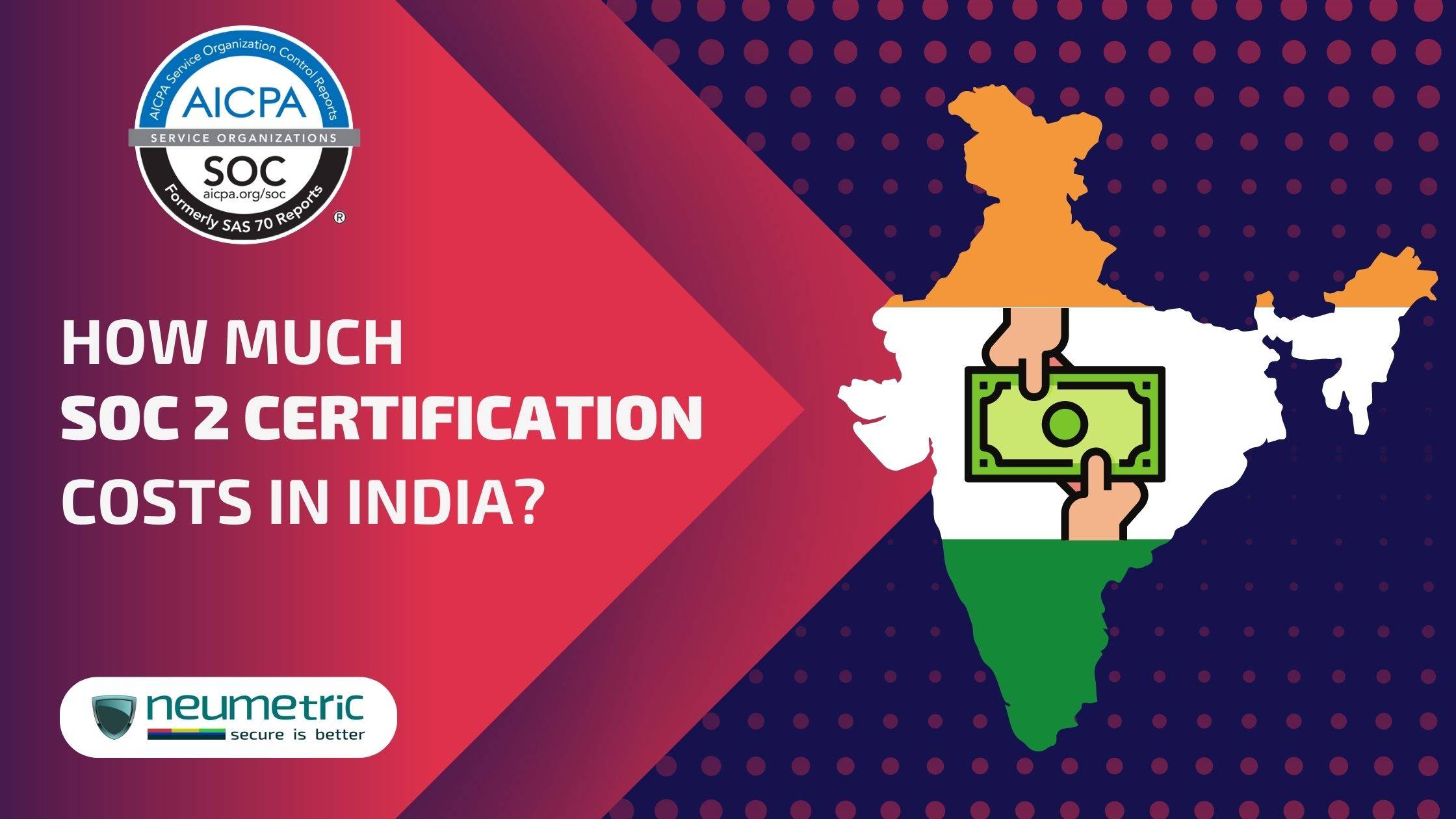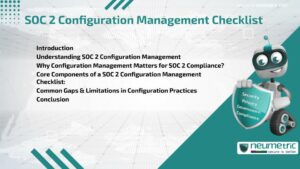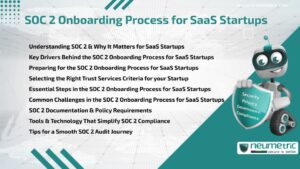Table of Contents
ToggleIntroduction
SOC 2 Certification is an Auditing Standard established by the American Institute of Certified Public Accountants [AICPA] to assess the effectiveness of an Organisation’s Information Security Policies, Procedures, and Controls. SOC 2 Certification evaluates an Organisation’s information security systems based on the criteria established by the AICPA’s Trust Services Criteria [TSC], which includes security, availability, processing integrity, confidentiality and privacy.
SOC 2 Certification is important for businesses because it provides assurance to customers, partners, and stakeholders that the Organisation has effective controls in place to protect their data and systems. SOC 2 Certification demonstrates an Organisation’s commitment to security, which can help build trust and credibility with customers and partners. It can also be a competitive advantage in industries where security is a primary concern, such as healthcare, finance, and technology.
Factors Affecting SOC 2 Certification Cost
- Type of SOC 2 Report: There are two types of SOC 2 Reports: Type 1 and Type 2. A Type 1 Report evaluates an Organisation’s controls at a specific point in time, while a Type 2 Report evaluates Controls over a period of time, typically six to twelve months. The cost of a Type 2 Report is typically higher than a Type 1 Report due to the additional Audit time required to evaluate controls over a period of time.
- Size of the Organisation: The size of the Organisation being Audited can also impact the cost of SOC 2 Certification. Larger Organisations typically have more complex systems and processes, which can require more Audit time and resources to evaluate.
- Complexity of the system: The complexity of the system being Audited can also impact the cost of SOC 2 Certification. Complex systems may require more Audit time and resources to evaluate, which can increase the cost of certification.
- Timeframe of the Audit: The timeframe of the Audit can also impact the cost of SOC 2 Certification. Rushed or expedited Audits may require additional resources and result in higher fees.
- Geographical location of the Audit: The geographical location of the Audit can also impact the cost of SOC 2 Certification. Auditors may charge more for travel and lodging expenses if the Audit is conducted in a remote or hard-to-reach location.
Average SOC 2 Certification Fees
When considering the cost of SOC 2 Certification, it is important to remember that the benefits of certification can outweigh the costs. SOC 2 Certification provides assurance to customers, partners, and stakeholders that the Organisation has effective controls in place to protect their data and systems. This can improve the Organisation’s credibility, reputation, and trust with its stakeholders, which can ultimately lead to increased revenue and growth.
Additionally, SOC 2 Certification is becoming increasingly important in many industries. Many customers and partners now require their vendors and service providers to be SOC 2 certified as a condition of doing business. Therefore, obtaining SOC 2 Certification can open up new business opportunities and help Organisations stay competitive in their industry.
SOC 2 Certification cost typically includes the following:
- Audit Fees: The Audit fees charged by the Auditor for conducting the SOC 2 Certification Audit is the most significant component of the certification costs. The fees charged by Auditors for SOC 2 Certification cost depend on various factors, such as the scope of the Audit, the complexity of the Organisation’s information systems, and the Audit timeframe. The more complex the Organisation’s systems and controls, the longer the Audit will take, and the higher the Audit fees will be. Auditors may also charge additional fees for any follow-up Audits required to address any issues identified during the initial Audit.
- Consulting Fees: Many Organisations choose to hire consultants to assist with the preparation and implementation of controls required for SOC 2 Certification. The fees charged by consultants depend on the services provided and the level of involvement required. Some Organisations may choose to hire consultants for a full-scale implementation project, while others may only require consulting services for specific areas or controls. The level of involvement required will determine the amount of consulting fees charged.
- Travel and Expenses: Travel and lodging expenses incurred by the Auditor during the Audit are typically included in the SOC 2 Certification costs. The Auditor may need to travel to the Organisation’s location to conduct the Audit, and the Organisation may be responsible for covering the Auditor’s travel and lodging expenses. The geographical location of the Audit can impact the travel and lodging expenses incurred by the Auditor, and Organisations should factor these costs into their budgeting process.
Overall, while the SOC 2 Certification cost can be significant, it is important for Organisations to consider the benefits of certification when evaluating the cost. Proper planning, budgeting, and negotiation can help Organisations reduce the cost of certification, but it is also important to select a qualified and experienced Auditor to ensure a successful certification process.
Tips for Budgeting for SOC 2 Certification
Planning and budgeting for SOC 2 Certification cost is crucial to ensure that the process is smooth and cost-effective. SOC 2 Certification requires significant effort and resources, including time and personnel, to ensure that the controls and policies are in place and operating effectively. Therefore, proper planning and budgeting help Organisations to allocate the necessary resources to the certification process.
When planning for SOC 2 Certification, it is important to understand the requirements and scope of the certification process. The AICPA’s Trust Services Criteria [TSC] sets out the criteria for SOC 2 Certification, and Organisations should ensure they have a comprehensive understanding of these criteria to identify the controls that need to be in place. A scoping exercise should be conducted to determine the systems, processes, and data that are in scope for the Audit.
Organisations can take several steps to reduce SOC 2 Certification costs, including:
- Conducting a pre-Audit review: Conducting an internal review before the Audit can identify potential areas of weakness and enable the Organisation to address any issues before the Audit. This can reduce the need for additional Audit time and costs.
- Minimising the scope of the Audit: Minimising the scope of the Audit can reduce the Audit time and costs. Organisations can limit the scope by defining the systems, processes, and data that are in scope for the Audit.
- Ensuring proper documentation: Proper documentation can ensure that the Audit runs smoothly and efficiently. This includes ensuring that policies and procedures are documented, and evidence of controls is readily available.
- Streamlining communication: Effective communication between the Auditor and the Organisation can reduce the Audit time and costs. The Organisation should designate a point of contact for the Auditor, and ensure that communication channels are clear and concise.
When negotiating SOC 2 Certification fees, Organisations should consider the following strategies:
- Requesting multiple quotes: Requesting multiple quotes from different Auditing firms can help Organisations to compare prices and select the most cost-effective option.
- Negotiating on Audit fees: Negotiating on Audit fees can help Organisations to reduce the overall cost of certification. This includes negotiating on hourly rates, fixed fees, or the scope of the Audit.
- Bundling services: Some Auditing firms may offer bundled services, which can include SOC 2 Certification, consulting, and other services. Bundling services can be a cost-effective option for Organisations that require multiple services.
Conclusion
SOC 2 Certification is an important Auditing standard that assesses the effectiveness of an Organisation’s information security policies, procedures, and controls. The SOC 2 Certification cost can vary widely depending on factors such as the type of Report, the size and complexity of the Organisation, the timeframe of the Audit, and the geographical location of the Audit.
When planning for SOC 2 Certification, it is important to allocate the necessary resources, conduct a pre-Audit review, and minimise the scope of the Audit to reduce costs. Organisations can also negotiate on Audit fees, request multiple quotes, and bundle services to reduce the overall cost of certification.
SOC 2 Certification is an essential component of an Organisation’s information security program. It provides assurance to customers, partners, and stakeholders that the Organisation has effective controls in place to protect their data and systems. While SOC 2 Certification cost can be significant, the benefits of certification in terms of improved security, trust, and credibility can outweigh the costs. Therefore, it is important for Organisations to plan and budget for SOC 2 Certification to ensure a successful and cost-effective certification process.
FAQs:
How much does it cost to get SOC 2 certified?
The SOC 2 Certification cost can vary depending on several factors, including the size of the Organisation, the complexity of the systems and controls being evaluated, and the chosen Auditing firm. However, the costs usually range from ₹4,00,000/- INR to ₹8,00,000/- INR.
How do I get my SOC 2 Certification?
To obtain a SOC 2 Certification, an Organisation needs to engage the services of an independent Auditing firm that is licensed by the American Institute of Certified Public Accountants [AICPA]. The Organisation must then undergo an Audit process, which involves demonstrating that their systems and controls meet the trust services criteria [TSC] established by the AICPA. This typically involves a readiness assessment, a gap analysis, and an official Audit.
How long does SOC 2 Certification take?
The length of time it takes to obtain a SOC 2 Certification can vary depending on several factors, including the complexity of the Organisation’s systems and controls, the scope of the Audit, and the chosen Auditing firm. Generally, the process can take several months to complete, including a period of time for the Audit firm to review and provide feedback on any necessary improvements to the Organisation’s systems and controls.
How much does SOC 2 cost startup?
The cost of obtaining a SOC 2 Certification for a startup can vary depending on the size and complexity of the Organisation’s systems and controls, as well as the chosen Auditing firm. However, for startups with smaller and less complex systems, the costs could range from ₹4,00,000/- INR to ₹8,00,000/- INR. It is important for startups to carefully consider the costs and benefits of obtaining a SOC 2 Certification before embarking on the process.





